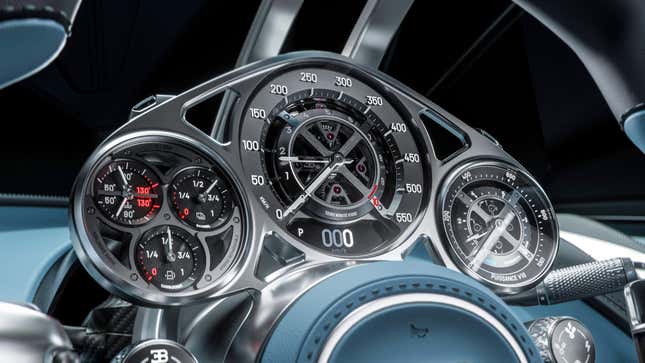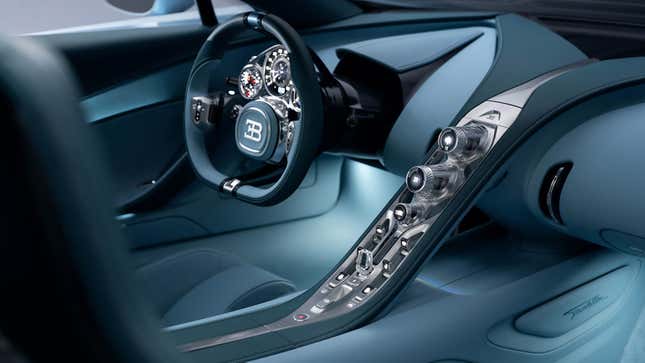The world saw the unveiling of the Bugatti Tourbillon, a new hypercar with a V16 hybrid powertrain and horological design inspiration on Thursday. There’s a lot to talk about with the Tourbillon, from its high-revving naturally aspirated engine to its crystal-covered interior, but what most people will focus in on is the gauge cluster. Inspired by the tourbillon mechanism, innovated by a Swiss-French watchmaker hundreds of years ago, the Bugatti Tourbillon’s dials are stunning, even for a watch-averse guy like me.
But even wilder than the gauges themselves are the way they’re mounted. The intricate titanium cluster is attached directly to the steering column, which is fixed — steering wheel hub included. Only the rim of the steering wheel is what actually turns, as the hub, gauges and attached control knobs all stay in place. It’s kinda similar to the mid-2000s Citroën C4, albeit much, much fancier.
The steering wheel rim has a flat bottom, sculpted thumb rests and a pair of button clusters at 9 and 3; the actual spokes are found at 12 and 6. Each a pair of aluminum bars, the spokes reach around behind the gauge cluster to attach to the back of the hub, which means the driver’s view of the gauges is unobstructed. It makes for a nice design element too, with the top of the wheel getting a racing-style contrasting color mark and the base of the wheel using the spokes’ design to form the launch control button.
Those gauges really are quite incredible. Made of over 600 parts (including rubies and sapphires) and engineered in conjunction with Swiss watchmaking experts, the whole cluster weighs just 700 grams and is built with exacting precision — Bugatti says the largest tolerance is 50 microns while the smallest is just 5. The center dial includes both the speedometer on the outer rim and the tachometer inside of it, and all of the internals and mechanisms are visible.

To go along with the complex gauges, the Tourbillon’s thin center console is a mix of anodized aluminum, milled from one block of metal, and crystal glass, developed through 13 stages to be both perfectly clear and safe in case of a collision. There are two main round control knobs, a few normal buttons normally set into the console, and a number of freestanding switches that sit kind of like foosball figures in the main bridge.
Instead of a normal start/stop button, the Tourbillon uses something like an organ stopper that Bugatti says is inspired by the starting mechanism of pre-war cars — you pull it out to turn the car on, push it in to turn it off. When needed, a small screen deploys from the top of the dashboard, taking two seconds for portrait mode to display the reverse camera or five seconds for landscape mode to use Apple CarPlay and other functions.
All of this can be yours for the mere sum of around $4 million — that’s before any options.
